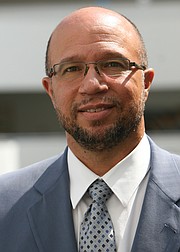Prostate cancer: To screen or not
Dr. Durado Brooks | 9/13/2018, 6 a.m.
September is Prostate Cancer Awareness Month and there are some important facts about prostate cancer that black men — and the women who love them — should know.
Black men are more likely to be diagnosed with and die of prostate cancer than any other group in the United States.
This is obviously a very concerning issue. But it’s also important to recognize that most men who are diagnosed with prostate cancer will not die from the disease. A lot of progress has been made in treating prostate cancer, and some of these treatments can completely wipe out the cancer and allow men to get on with their lives. And even when prostate cancer is not curable, there are treatments that can keep it under control for many years.
As with most cancers, treatment for prostate cancer works best when the disease is in its early stages — that is when the tumor is small and has not spread to other parts of the body.
While we don’t know why black men are more likely to get prostate cancer, we do know that at least one reason for their higher death rate is the fact that they often get diagnosed at later stages, after the cancer has spread outside of the prostate gland. It is also clear that doctors are more likely to find prostate cancer at an earlier stage when men get screened for the disease.
There are two screening tests for prostate cancer. The best available test is a blood test called the prostate specific antigen, or PSA, test. The second test is done during a physical exam. Because the prostate gland sits at the top of the bladder and in front of the lowest part of the colon, doctors can examine part of the prostate directly by inserting a finger into the rectum — a digital rectal exam or DRE.
Men who choose to be screened can have the blood test alone or both the PSA blood test and the DRE. By combining both tests, doctors may find a few cancers that are not picked up by the blood test alone, but some cancers still may be missed.
Although screening can help find cancer earlier, screening for prostate cancer is not something that every man should automatically do. That’s because not every prostate cancer is the same. Some cancers grow very slowly and never will cause harm if they are left alone. Other cancers are much more aggressive, will grow and spread rapidly and have a much higher chance of causing harm and death.
These aggressive tumors are more common in black men, contributing to their higher risk of death. However, both of these types of cancer can be found by screening and sometimes it’s not clear which type of tumor may be present.
While treatment can lower the risk of dying from prostate cancer, treatment also can cause complications. Some men will have difficulty controlling their urine and some men may have problems with their sex life. It is important to recognize that most men treated for prostate cancer will not experience these complications. There also are treatments that can help many of the men who do.
When deciding whether or not to get screened for prostate cancer, black men should take into account their higher risk of developing the disease and their higher rates of aggressive tumors and weigh this against the chance that, if cancer is found and treated, they may have to live with some new challenges.
Experts know this is a complicated decision, and for that reason have developed tools to help men understand the issues around screening for prostate cancer. The tools will help each man make a decision that’s right for him.
A link to one tool can be found here: https://www.cancer.org/content/dam/cancer-org/cancer-control/en/booklets-flyers/testing-for-prostate-cancer-handout.pdf
Take advantage of Prostate Cancer Awareness Month to educate yourself about this disease and share this knowledge with other men to allow them to make informed decisions about their health.
The writer is vice president of cancer control interventions for the American Cancer Society.








